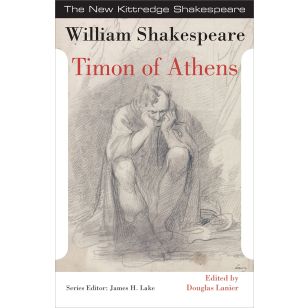Timon of Athens
"Timon of Athens is one of the most enigmatic and underappreciated of Shakespeare's plays, yet its urgency for our times is not to be understated. Guided by Douglas Lanier's astute and accessible commentary throughout, this edition positions Timon in a range of historical, theoretical, and performance contexts. The superb Introduction and supplementary resources help the reader navigate key issues—ranging from money, friendship, and cynicism to art, ethics, and collaborative authorship—as well as consider contemporary adaptations on stage and screen. This edition will be a welcome resource for teachers and students at both undergraduate and graduate levels." —Jay Zysk, Department of English, University of Massachusetts Dartmouth
"Douglas Lanier's Introduction immerses us in the play's daring experiments with genre, its ethical and economic dilemmas, and its emotional and tonal range. He shows how Timon of Athens not only resonates with our troubled cultural moment but also speaks eloquently of its own times. His essay on appreciating the play as a performance script advises us expertly on how to read it as directors do and how to be alert to its radical openness to interpretation." —Stephen M. Buhler, Department of English, University of Nebraska–Lincoln
An eBook edition is available for $7.95, click here for more information and purchasing options. Ebook examination copies are also available to qualified course instructors.
George Lyman Kittredge's perceptive editions have endured in part because of his eclecticism, his diversity of interests, and his wide-ranging accomplishments—all of which are reflected in the valuable notes in each volume. The plays in the New Kittredge Shakespeare series retain the original Kittredge notes and introductions, changed or augmented only when some modernization seems necessary. These new editions also include introductory essays by contemporary editors, notes on the plays as they have been performed on stage and film, and additional student materials.
Reviews:
"Timon of Athens is one of the most enigmatic and underappreciated of Shakespeare's plays, yet its urgency for our times is not to be understated. Guided by Douglas Lanier's astute and accessible commentary throughout, this edition positions Timon in a range of historical, theoretical, and performance contexts. The superb Introduction and supplementary resources help the reader navigate key issues—ranging from money, friendship, and cynicism to art, ethics, and collaborative authorship—as well as consider contemporary adaptations on stage and screen. This edition will be a welcome resource for teachers and students at both undergraduate and graduate levels."
—Jay Zysk, Department of English, University of Massachusetts Dartmouth
"Douglas Lanier's Introduction immerses us in the play's daring experiments with genre, its ethical and economic dilemmas, and its emotional and tonal range. He shows how Timon of Athens not only resonates with our troubled cultural moment but also speaks eloquently of its own times. His essay on appreciating the play as a performance script advises us expertly on how to read it as directors do and how to be alert to its radical openness to interpretation."
—Stephen M. Buhler, Department of English, University of Nebraska–Lincoln
"An ideal addition to my syllabus; I regularly teach this play owing to my current students' interest in business and management. Also, in my own work, I follow 19th century readers of Timon, most especially Karl Marx who quotes from it at length in his notes in Capital, Volume 1. I applaud the volume editor, Douglas Lanier, for his care in glossing and also for making connections (below the line) to other works by Shakespeare—which makes a good case for considering Timon as being more central to the overall Shakespeare canon than previously assumed (and notwithstanding Middleton's role in this play as well as in, of course, Macbeth). This is a handy and inexpensive edition that my students will enjoy using."
—William Engel, Sewanee: The University of the South
About the Authors:
Douglas Lanier is Professor of English, University of New Hampshire.





